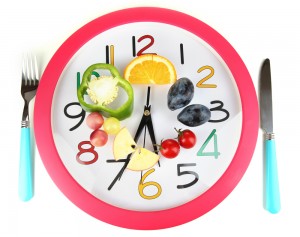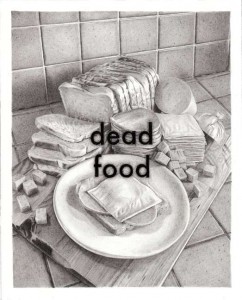Eating Can Be A Good Habit by Alayna Roche
Eat Less, Feel Better, Live Longer
 The diets of hundreds of centenarians who lived under modest circumstances were analyzed and the studies found that they ate less than the average amount. Some even fasted at times, either by choice or because of the lack of food or money. Most of the centenarians who were surveyed were known to follow the “three-quarters” rule. This is where the individual stops eating when they are three-quarters full. A reduction in caloric intake can increase life expectancy.
The diets of hundreds of centenarians who lived under modest circumstances were analyzed and the studies found that they ate less than the average amount. Some even fasted at times, either by choice or because of the lack of food or money. Most of the centenarians who were surveyed were known to follow the “three-quarters” rule. This is where the individual stops eating when they are three-quarters full. A reduction in caloric intake can increase life expectancy.
Smaller Meals, Frequent “Feast”
Eating three square meals daily is a cultural habit, not a biological need. Eating smaller portions 4-5 times daily delivers a steady stream of nutrients, energy and blood sugar. Smaller meals also help prevent overloading and access waste accumulation, which is easier on the digestive and metabolic systems. Smaller meals also help reduce the risk of heart disease.
You Are WHEN You Eat
 The human body works off a circadian rhythm, meaning that the same foods one eats in the morning or afternoon will process differently in the body when eaten at night. When daily fats and proteins are eaten at breakfast, one tends to lose weight and waste and have more energy. Eating the same things at night produces fat cells that can increase weight, blood pressure and heart disease.
The human body works off a circadian rhythm, meaning that the same foods one eats in the morning or afternoon will process differently in the body when eaten at night. When daily fats and proteins are eaten at breakfast, one tends to lose weight and waste and have more energy. Eating the same things at night produces fat cells that can increase weight, blood pressure and heart disease.
Varying Vegetarian
Studies have shown that vegetarians suffer fewer degenerative diseases and cancers, especially when adding substitute proteins such as nuts and beans to their diet. An estimated 1/3 of all cancer patients developed their disease as a result of insufficient whole plant fiber in their diets. If you love meat, you do not have to give it up entirely to enjoy longevity. Limiting your meat intake or eating meat only on the weekends can be a perfectly healthy and balanced approach.
Stop Eating “DEAD” Foods to Stay Alive
 Fresh, whole, organic foods will help you maintain your health and well being. Farm Fresh is the best, especially organic meats and produce. Many of the foods in the supermarkets have been slaughtered or picked weeks to months before they make it to the grocers’ shelf. These items are preserved by many artificial means, including nitrogen and aspartame. These additives make the food appear fresh though they are most likely past their nutritional prime. They are also treated with pesticides and artificial fertilizers, which lowers the nutritional value of food and can be toxic. Always try to buy organic when it comes to produce and meats; especially chicken, strawberries and blueberries, as well as any other porous fruits or vegetables.
Fresh, whole, organic foods will help you maintain your health and well being. Farm Fresh is the best, especially organic meats and produce. Many of the foods in the supermarkets have been slaughtered or picked weeks to months before they make it to the grocers’ shelf. These items are preserved by many artificial means, including nitrogen and aspartame. These additives make the food appear fresh though they are most likely past their nutritional prime. They are also treated with pesticides and artificial fertilizers, which lowers the nutritional value of food and can be toxic. Always try to buy organic when it comes to produce and meats; especially chicken, strawberries and blueberries, as well as any other porous fruits or vegetables.
A.J Roche’ is an Author and Creative Collaborator at Community Publishing. Community Publishing brings local artists of all mediums together in creative collaborations for distribution as multimedia eBooks while promoting literacy in our communities. #JoinOurCommunity at http://communitypublishing.org
Community Publishing is a proud partner and Marketer at the Rail Yards Market.


















